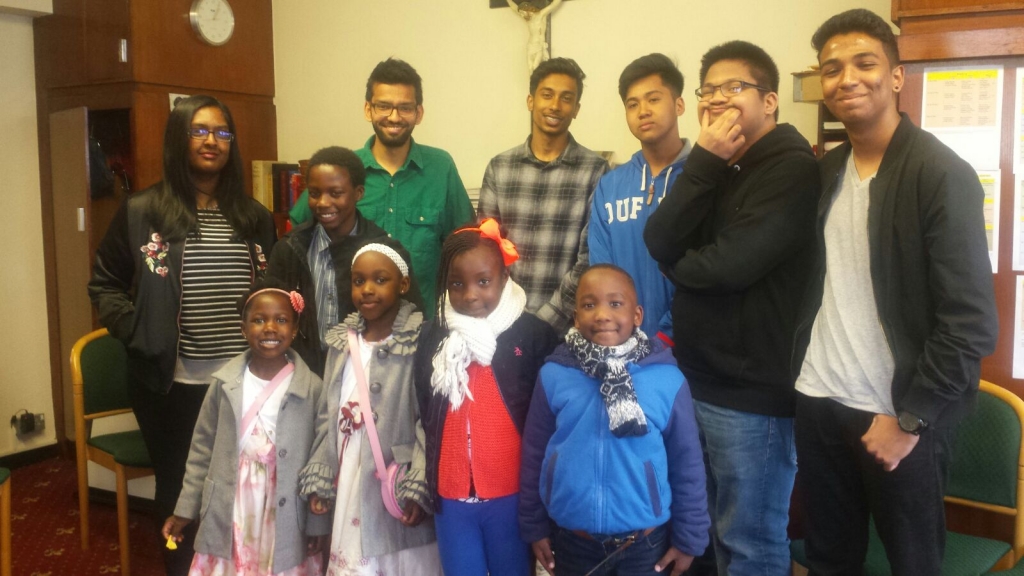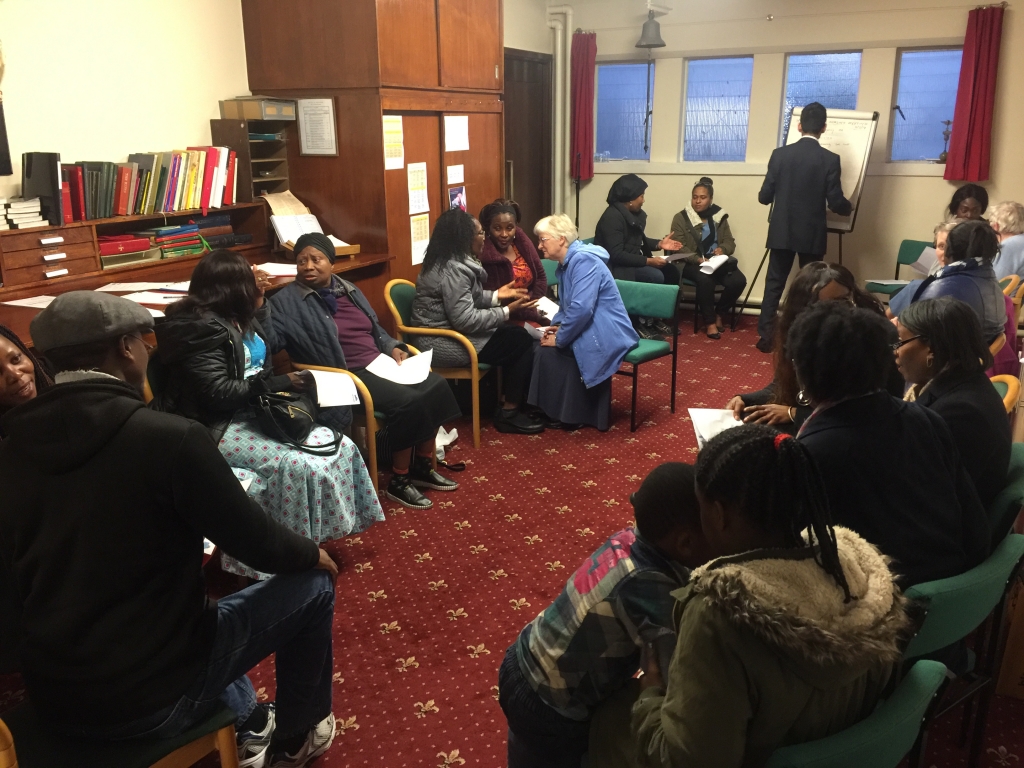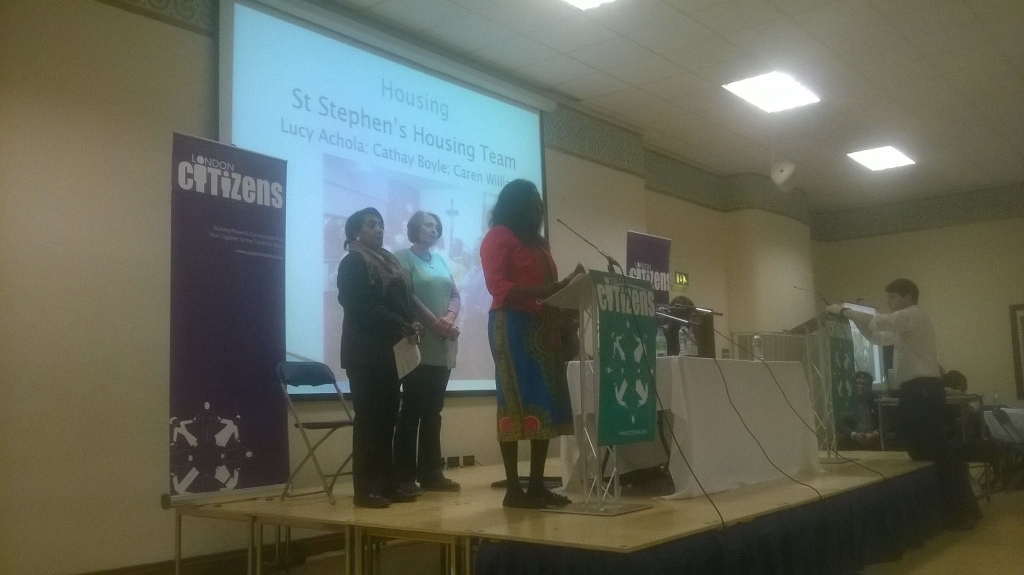 Dunstan Rodrigues – one of this year’s Buxton interns – practises church based community organising in the Catholic Parish of St Stephen’s, Manor Park. Here he reflects on what he has learnt while working for affordable housing and developing young leaders.
Dunstan Rodrigues – one of this year’s Buxton interns – practises church based community organising in the Catholic Parish of St Stephen’s, Manor Park. Here he reflects on what he has learnt while working for affordable housing and developing young leaders.
At the beginning of the year, the CTC team reflected on Luke 6:6-11, a passage which has been both challenging and helpful for me in shedding light on the art of community organising.
On another Sabbath, Jesus entered the synagogue and was teaching, and a man was there whose right hand was withered. The scribes and Pharisees were watching him to see if he would cure a man on the Sabbath, hoping to find something to use against him.
But Jesus knew what they were thinking and said to the man with the withered hand,
“Stand up! Come out into the middle”. So he arose and stood there.
Then Jesus said to them, “I ask you, which is lawful on the Sabbath: to do good or to do evil, to save life or to destroy it?”
He looked round at them all, and then said to the man, “Stretch out your hand.” He did so, and his hand was completely restored.
But they were furious and began to discuss with one another what they might do to Jesus.
Imagining myself in the scene, the phrase that struck me was: ‘Stand Up! Come out into the middle’. I found Jesus’ command discomforting.
This, I think, is because my own instinct was to deflect attention away from the man with the withered hand, not to bring him to the centre; more generally, to speak and advocate for others, rather than let them speak for themselves; to abstract to the realm of ideas and rhetoric, rather than confront the reality revealed in people’s lives.
Looking back over the past few months, this has been a recurrent theme — namely, my tendency to abstract away from people’s lives. And, it has only been when I have not done this, normally after an experience of failure, that the organising has been fruitful and enriching.
Working for Affordable Housing
My strong instinct while working for affordable housing over the past nine months has been to initiate ideas rather than confront the reality of people’s lives. St Stephen’s, like many East London communities, is filled with people struggling from issues such as severe overcrowding, bad damp, unpredictable rent hikes, and the fear of forcibly moving away from their home. Upon hearing these stories, I wanted to find a solution swiftly. As such I skipped the search for leaders, and instead tried to impose my ideas at our meetings, rendering them contorted, stressful and rather fruitless affairs.
Over time, however, and thanks to a handful of 1-2-1s, a number of new leaders emerged. They had a great energy and anger that did not come from me but rather sprung from their own experiences and memories.
One such leader is Lucy Achola, a mother of three who faced imminent housing eviction. A week after a housing assembly we held within the Church, the Council changed its position – Lucy triumphed. She shared her story with zeal in front of hundreds of delegates (pictured) at TELCO’s Delegates Assembly. Seeing her speak with such zeal and power was very inspiring, as if called by Jesus to ‘Stand Up! Come out into the middle’.
Developing young leaders
My attempts at youth development within St Stephen’s have similarly revealed the futility of imposing my own ideas in comparison with discovering – and starting from – the reality of people’s lives.
My 1-2-1 conversations uncovered stories of young people working in poorly paid and exploitative jobs or seeking employment, feeling both isolated from and pressurised by friends and family alike. One individual had taken his CV up and down the high street in search of a job to no avail, and is now in insecure work on a zero hour contract.
Again, feeling a need to do something about this, my instinct was to abstract immediately to the realm of ideas – how could the community help create dignified work in the area by negotiating with local businesses? How could we as Church help the young people makes use of their talents and discover their vocation? I brought these ideas to a youth meeting with little success.
A few weeks later we had another meeting. Instead of starting with a set of ideas, we meditated on John 1:37-39, describing the disciples’ first encounter with Jesus:
‘….the two disciples followed Jesus. Jesus turned around, saw them following and said, ‘What do you want?’ They answered, ‘Rabbi,’ – which means Teacher – ‘where do you live?’ ‘Come and see’ he replied; so they went and saw where he lived, and stayed with him for the rest of that day’
We imagined Jesus asking us: ‘What do you want?’ – the Lord Himself probing our self-interest! One of the young people called Kevin shared his response with the group; namely, his desire to work with other religious communities in Manor Park on common issues. As a result he will be attending the upcoming TELCO two day training and visiting nearby institutions over the summer.
How much more fruitful was our discussion when centred not on my own ideas but the Word of God itself!

Realities more important than ideas
That our initiatives as Church are rooted in realities more than just ideas is a powerful and challenging maxim in Pope Francis’ Evangelii Gaudium (231-233). As he puts it:-
Realities simply are, whereas ideas are worked out. There has to be continuous dialogue between the two, lest ideas become detached from realities. It is dangerous to dwell in the realm of words alone, of images and rhetoric. So a third principle comes into play: realities are greater than ideas.
Our tendency to become detached from realities explains the weakness of many of our institutions:
We have politicians – and even religious leaders – who wonder why people do not understand and follow them, since their proposals are so clear and logical. Perhaps it is because they are stuck in the realm of pure ideas and end up reducing politics or faith to rhetoric.
It seems to me that the tools of community organizing – the importance of 1-2-1 relational meetings, the necessity of group evaluation and research, the realism and practice-focused approach to change – can be an excellent way to follow Francis’ exhortation to ‘put the word into practice, to perform works of justice and charity which make that word fruitful.’
At the same time, however, the maxim also challenges and disciplines the practice of organising. To swiftly pursue a set of abstract ideas – the ‘world as it should be’ –can easily be rather fruitless. First and foremost, we must discover the rich realities of people’s lives; find out about our parishioners’ struggles and joys with seriousness and rigour; and welcome the unheard voices of the poor into the centre of our politics.



Leave a Comment